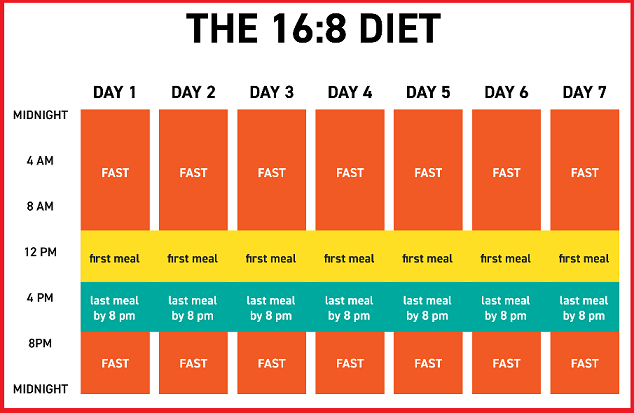What Is Intermittent Fasting
Intermittent fasting for weight loss has become one of the top methods to quickly lose weight. It involves an eating pattern where you have a set period of time when you eat and a period when you don’t eat anything at all. The focus is not so much on what you eat but when you eat.
For example, you may have a set amount of time where you will allow yourself to eat, say 8 hours, and the remaining 16 hours of the day you abstain from any foods or beverages containing calories. Many people will have a cut off time of around 8PM where they will not eat again until 12pm lunchtime. Then through out the day they can have their three regular meals or opt for two meals and a snack, as long as their last snack is before 8PM.
While many people practicing intermittent fasting for weight loss abstain from no food or beverages at all, it’s generally seen as acceptable to consume 0 calorie drinks like water, tea, or black coffee. Barley tea can be a helpful weight loss tea that will help you feel full along with many other health benefits.
How Do I Do Intermittent Fasting

How Long Should I Fast For?
The most common time-restricted eating periods with intermittent fasting for weight loss are 16/8 and 14/10. That’s where you won’t eat for 16 or 14 hours, and will allow yourself to eat in the window of 8 to 10 hours. If you are a beginner to fasting it may be easier to work your way up to longer periods of fasting. 12/12 may be a good starting point where the majority of your fasting time will be when you are asleep. If you want to challenge yourself to a more rigid cycle, you can fast for 24 hours straight once or twice a week.
How Many Times A Week Should I Fast?
How often you practice intermittent fasting for weight loss really depends on your personal goals. If you’re looking to quickly cleanse and detox your body and lose weight as quick as possible, fasting for 24 hours twice a week can help speed up results. If your goal is to steadily lose weight, speed up your metabolism, and live a healthier lifestyle, having a segmented day of an eating and fasting schedule 5 days to everyday of the week would be ideal.
If fasting everyday is a bit difficult there’s no harm in fasting only 2-3 days a week. You will still receive the benefits of intermittent fasting for weight loss so long as you are maintaining a healthy diet when you do eat.
Related: What is Mukbang?
Benefits of Intermittent Fasting

Metabolism
When you don’t consume food for a prolonged period of time, your body taps into its stored fat for energy instead of sugar. Your body will make the changes needed to maintain it’s normal state while adjusting to the calorie deficit. This adjustment will speed up your metabolism and cause you to burn more calories.
Fasting for long periods will signal your body to lower its insulin levels. Insulin causes the body to store energy as fat which can result in weight gain. Fasting helps reverse this process so fat is burned quicker instead of being stored in your body. Intermittent fasting for weight loss is an effective way to reset your metabolism and shed extra pounds.
Diabetes and Obesity
Due to the insulin resistance levels being reversed during fasting, intermittent fasting has shown to reduce diabetes symptoms. During a fast, the amount of insulin levels in your blood is reduced and your body’s insulin sensitivity is increased, essentially replicating the process of diabetes medications. Resistance to insulin will improve with a calorie restriction as well as an improvement in controlling glycemic levels.
Some people with type 1 and type 2 diabetes have found that fasting for longer periods overnight can help with fluctuating sugar levels as well as energy levels, especially in the morning. While intermittent fasting’s benefits for diabetes can help improve A1C levels, insulin resistance, and blood pressure, the largest effects result from weight loss.
Intaking less calories and increasing the amount of fat your body burns can also help combat visceral obesity and health issues that come along with it. A recent study on intermittent fasting for weight loss has shown adults with obesity who stuck to an 8 hour eating and 16 hour fasting schedule at least 2-3 times per week for 12 weeks experienced weight loss of about 4-5 pounds. Those who practiced intermittent fasting at least 5 days a week lost the most weight at an average of around 8 pounds over the 12 weeks.
Many people who struggle with dieting and restricting daily caloric intake or specific foods tend to find more success in intermittent fasting for weight loss. Being more liberal in what you allow yourself to eat and only restricting eating times to a certain time period can help reduce the total amount of calories consumed with out the feeling of hunger or lack of energy through out the day.
Heart Health
Intermittent fasting for weight loss may also help prevent and manage heart disease. Having a bad diet not only makes you gain weight but also causes health issues like high blood pressure, inflammation, and cholesterol build up in your arteries, the top contributors to having a heart attack or other health conditions. Fasting’s effect on the body can help improve your cholesterol, triglyceride, and blood-sugar levels, reducing the chance of cardiovascular disease.
Intermittent fasting is also said to bring your body to a ketogenic state which has been closely linked to decreasing cardiovascular risk. Ketosis is a process that occurs when your body doesn’t contain enough carbs to burn for energy and instead burns fat. The ketosis state caused by fasting helps reduce inflammation and lowers oxidative stress for overall better heart health.
Inflammation
Intermittent fasting has shown to reduce the number of pro-inflammatory cells in the blood circulation. These pro-inflammatory cells known as monocytes contribute to or are a side effect of many conditions associated with inflammation like: Alzheimer’s disease, diabetes, arthritis, asthma, MS, stroke, depression, anxiety, cancer, gout, and heart disease.
Inflammation is your body’s immune system’s way of fighting off infection, injury, and bacteria. Chronic inflammation will weaken your body’s overall immune system and health, allowing other harmful conditions to set in. Experts have all agreed that a good amount of inflammation comes from eating too much and too often. Fasting is a natural and safe way to reduce inflammation in the body, lowering risk from metabolism disorders.
Brain and Memory
One of the first symptoms you may experience when practicing intermittent fasting for weight loss regularly is a new clarity of mind. Intermittent fasting is an effective way to maintain brain health especially in reducing brain fog, lethargy, and enhancing long-term memory.
Studies in mice have shown intermittent fasting to play a central role in increasing adult neurogenesis, and is even more effective than a calorie restricted diet. In a recent study, researchers created three groups of mice; a control group that received a normal daily diet, a group that were fed a calorie restricted diet, and a group where mice were put on an intermittent fasting diet of being fed every other day.
Related: Be A Weekday Vegetarian – Health, Beauty, and Environmental Benefits
Over the course of three months, the group that was on the intermittent diet showed clear signs of higher memory retention compared to the other groups due to the Klotho gene being upregulated and neurogenesis (the process by which new neurons are formed in the brain) increased. The trials suggest that intermittent fasting is an effective way to improve long-term memory retention in humans.
The effects of metabolic switching also helps increase neuroplasticity in the brain which will improve general brain cognition as well as reduce risk of injury or disease. Eliminating excess consumption of unhealthy foods like sugar contributes to getting rid of feelings of brain fog and lethargy which will result in better mood and energy levels.
Read More: How To Reject Someone Nicely
Risks and Side Effects of Intermittent Fasting
While intermittent fasting for weight loss is generally safe and risk-free, there may be some unpleasant side effects or potential risks if you have underlying health issues.
Some common side effects you may experience:
Hunger
Fatigue
Low Energy
Insomnia
Nausea
Headaches
Irritability
Bad Breath
Dehydration
Digestive Issues
Who Should Avoid Intermittent Fasting
Women who are pregnant or breast-feeding should not do intermittent fasting. If you have high caloric needs due to work out routines or if you are already underweight, fasting can slow down progress and proper development.
Children and adolescents under the age of 18 are not recommended to partake in intermittent fasting as these periods require proper nutrition for rapid growth. All though children should also stay on a regular eating schedule that doesn’t involve binge eating or snacking all day.
People with kidney stones, gastroesophageal reflux, diabetes or other medical problems should typically refrain from participating in fasting or at least consult with a doctor first.
It’s also important to avoid overeating when intermittent fasting for weight loss. Beginner fasters may feel the urge to binge eat when it’s time to break the fast. Fasting may also lead to an increase in the stress hormone cortisol which can cause food cravings. Overeating after a fast will cause your insulin and blood sugar levels to rapidly spike which will negate any benefits from fasting and could possibly cause more harm.
Read More:








+ There are no comments
Add yours